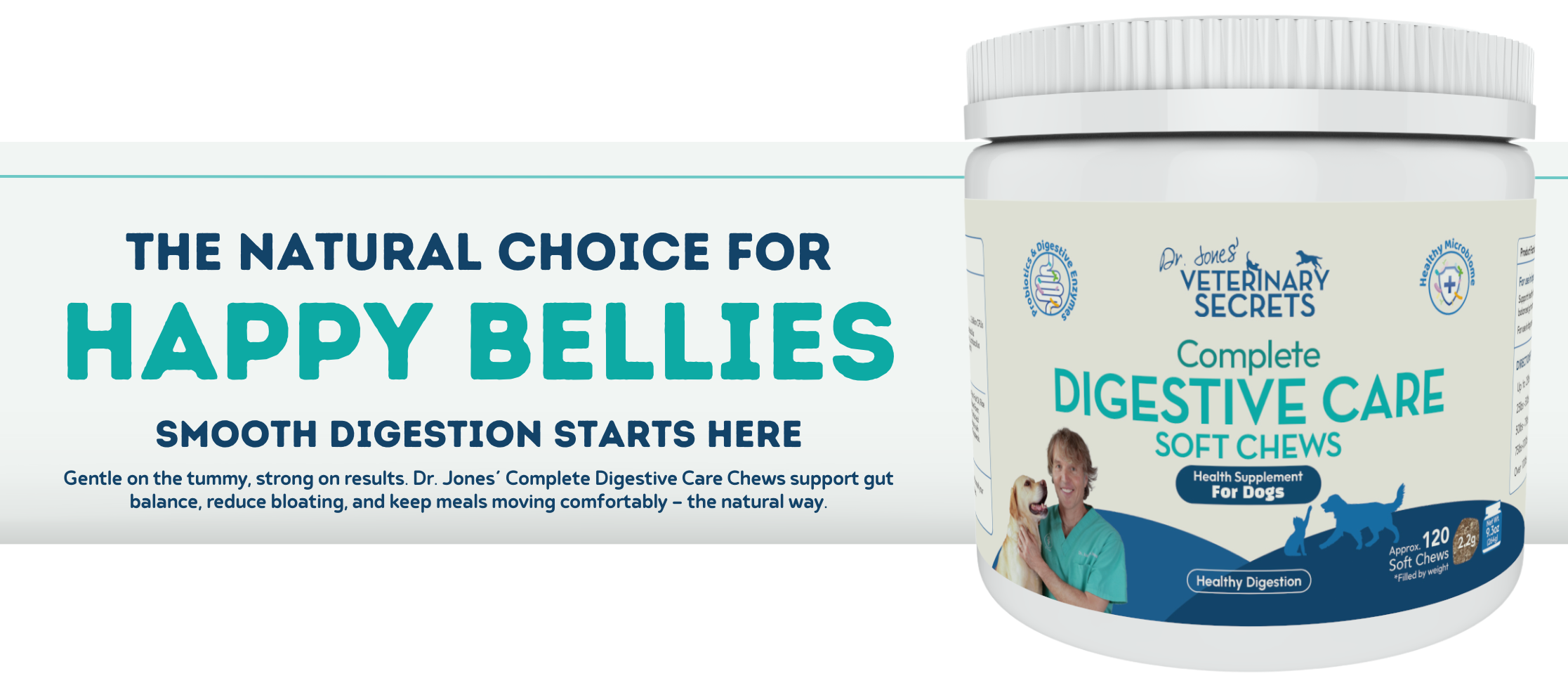How to Treat Dog Acid Reflux Naturally (Vet-Approved Remedies That Work)
![]()

GERD in Dogs: Real Causes and Natural Remedies That Work
GERD, or Gastroesophageal Reflux Disease, is a huge problem in people, and it’s now becoming increasingly common in our dogs too. The good news is, there are effective holistic options that can really help your pet feel better. In fact, these natural remedies are often much safer and more effective than conventional drugs—for both dogs and people.
One common cause of reflux is poor digestion. When your dog isn’t breaking down food properly, stomach acid can back up into the esophagus, leading to discomfort and irritation.
If your dog struggles with this, one of the best options to consider is Dr. Jones’ Complete Digestive Care Soft Chews, which help support digestion naturally with enzymes and probiotics.
Soothe Sensitive Stomachs Naturally with Dr. Jones’ Complete Digestive Care Soft Chews


Home Remedies for Acid Reflux (GERD) in Dogs and Cats
Have you noticed your dog gulping, licking lips, or regurgitating after meals? These could be signs of acid reflux, also known as GERD. This happens when stomach acid moves backward into the esophagus, causing irritation or inflammation.
Common Signs of GERD:

-
Lip licking, gulping, or repeated swallowing
-
Decreased appetite
-
Coughing or change in bark or meow
-
Pacing or restlessness, especially at night
-
Regurgitation (food coming back up without heaving)
-
Weight loss
-
Changes in their voice or tone
Diagnosis
Your vet may start with a physical exam, blood tests, and X-rays to rule out other conditions. If GERD is suspected, an endoscopy can confirm inflammation or irritation of the esophagus.
Natural Remedies for Acid Reflux in Pets
Here are the simple, at-home treatments I recommend that can make a real difference for your dog or cat.

1. Eliminate Saturated Fats
Fatty foods like bacon and greasy meats increase stomach acid. Choose lean protein sources such as chicken or turkey, and avoid fatty treats.
Tip: Slightly elevate your dog’s food bowl during the flare-up phase to help reduce acid backflow. Once symptoms improve, return to normal height feeding to maintain esophageal strength.
2. Try Alkaline Water
Offering alkaline-filtered water can help buffer stomach acid, reducing discomfort in both pets and people.
3. Pepcid (Famotidine)
A safe over-the-counter option to reduce stomach acid.
Dose: 2.5 mg per 10 lbs of body weight, given 2–3 times daily.
4. Slippery Elm
A fantastic natural coating and antacid for the stomach and intestines. It soothes irritation and promotes healing.
Dose: 400 mg per 20 lbs, twice daily.
5. DGL (Deglycyrrhizinated Licorice Root)
Another effective natural antacid that helps reduce inflammation.
Dose: 100 mg per 10 lbs, twice daily.
While both are useful, I find Slippery Elm to be more effective and better tolerated for most pets.
6. Add Fiber
Fiber helps food move smoothly through the digestive tract, lowering the chance of reflux.
-
Ground flaxseed: 1 teaspoon per 20 lbs, twice daily
-
Pumpkin: An excellent high-fiber addition to meals
7. Support the Esophageal Sphincter
For many dogs, the issue isn’t too much acid—it’s that the sphincter isn’t closing properly.
Passionflower can help by calming the nervous system and improving muscle tone, while melatonin has been shown to strengthen the sphincter.
My Canine Calming Chews contain both melatonin and passionflower, which may help ease reflux and anxiety.
Melatonin dose: 2 mg per 20 lbs, once daily.
When to See Your Vet
If your pet continues to regurgitate, loses weight, or still seems uncomfortable despite these remedies, your veterinarian may recommend:

-
Prescription acid reducers (Ranitidine, Omeprazole)
-
Coating agents like Sucralfate
-
Motility drugs to strengthen the esophageal sphincter
-
In rare cases, surgery for anatomical problems such as a hiatal hernia
My Experience and Final Thoughts
GERD is surprisingly common, but many pet parents don’t realize their dog has it. For years, it wasn’t even something we talked about much in practice.
I’ve seen many dogs with chronic intestinal issues respond really well to digestive enzymes and probiotics. That’s why I developed Dr. Jones’ Complete Digestive Care Soft Chews. They’re designed to support healthy digestion and prevent the underlying problems that often lead to reflux.
These ingredients work together to improve nutrient absorption, balance gut bacteria, and support the entire digestive system.
Give your dog the gift of a healthy gut and a comfortable tummy.
Try Dr. Jones’ Complete Digestive Care Soft Chews today to help stop reflux, bloating, and discomfort before they start.









Great information. I have gradually weaned my dog from Metoclopramid. BHe is 70lbs. I am giving him 3 digestive care chews daily. Is it still ok to give him 1200 mg of slippery elm 2x a day? Currently have him taking 800 mg a day.
The suggested dose of Slippery Elm for dogs is 400 mg per 20 lbs, twice daily. For a 70-lb dog, that calculates to about 1,400 mg twice daily (? 2,800 mg per day).
Since you’re giving 1,200 mg twice daily (2,400 mg/day), you’re slightly under the guideline dose, so yes—it’s still okay based on that reference.
Do I need to add the slippery elm to water and make a slurry before giving it to my dog or can he just take the capsule?
Both ways can work, but mixing the slippery elm into a little water first to make a slurry usually gives the best results for soothing your dog’s tummy. When it’s mixed, it gets mushy and coats the esophagus and stomach more gently, which is exactly what you want for reflux or GERD.
If you’re using capsules and your dog swallows them well, that’s fine too, just know the powdered form tends to work faster on an upset belly when mixed.